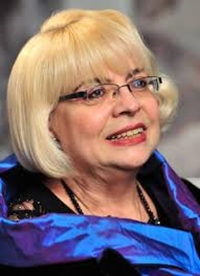Irina Margareta Nistor (b. 26 martie 1957, Bucharest) is today known as a film critic and as the unmistakeable voice that under communism dubbed practically all the Western films that circulated (semi)clandestinely on video cassettes and were seen by millions of citizens of Romania. She graduated in French and English from the Faculty of Philology and Letters of the University of Bucharest. Before 1989, she was employed by public television, and since 1989 she has collaborated with an impressive number of television and radio stations and with various publication belonging to the print press.
Before 1989, she translated and dubbed with her own voice approximately 3,000 Western films, which were recorded on video cassette and then distributed throughout the country. In her entire professional activity, both before and since 1989, she has translated and dubbed over 5,000 films and translated over seventy books from English, French, Italian, and Spanish.
She is now convinced that the films that she translated and dubbed for video cassette circulation before 1989 constituted a “window towards the West.” As she herself puts it: “Categorically, yes. Both for me and for those who managed to watch them. For everyone they were, in fact, something of that sort. Even for the communist big shots – because they got their hands on the cassettes too. For me, this “shock of the West” was probably felt less than for other people. In our home, these matters were talked about – sympathetically. We were always anticommunist, always royalist. We talked as openly as was possible about these things. And about the more luminous reference point of our world – namely the West. I know that through these films, many of them “consumer cinema,” so to speak, I was bringing a trickle of the West into Romania. I didn’t believe – there’s no point in exaggerating now – that this would bring them down. But I wanted to see how far it would go. How far and how long they would let me. And it went quite far.”
She does not consider that her translation and dubbing of over 3,000 Western films (semi)clandestinely in communist Romania constituted some kind of noble mission. She does not claim to have been a dissident. “Perhaps I would have liked to have been conscious of something of this sort; I would probably have felt better. I was, as I was saying, convinced that the communist system would last an eternity – that as my folks used to say, it would last as long as the Middle Ages. So, what I was doing there, translating films, was my way of cutting myself off from that system, of ignoring it as far as I could. When I went in and translated, when I entered into that film, so to speak, I no longer knew what was happening round about: that they were cutting my gas, my electricity, that I didn’t have bread, milk, butter, meat. I no longer knew that it was cold, that they weren’t giving us heating, that they had rationed all foodstuffs, that every year my father had to go with his typewriter to the Militia and declare it, in case anyone thought we were writing some manifesto or other. It was, if you like, my way of arranging a space of freedom for myself.
Regarding communism, she takes a very critical view: “To put it simply: [I considered communism] to be an error of history in which I had been born and, equally, to be endless. I had been born in communism and I was convinced that I would die in communism. Plus that I had been born at the wrong time. I did not feel that it would collapse. I thought of communism that it was stronger than it proved to be.”
At present she is one of the best-loved film critics in Romania, who has managed at the same time to have a notable international career. She comments regularly in the mass-market press in Romania on the major film festivals that take place each year. She is also frequently a member of film festival juries. For a number of years she has organised a Festival of Psychoanalysis and Film. She has been decorated with the Order of Carol I, accorded by the Royal House of Romania.

